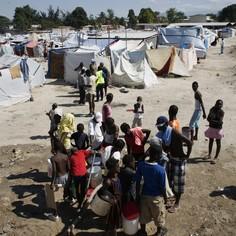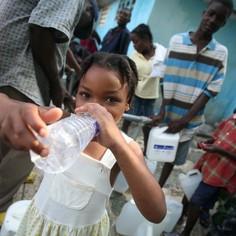
Humanitarian and Development
Place
Ouest department (Port-au-Prince, Petit-Goâve) and Artibonite department, Haiti
Date
Haiti, January 2010
Partners
French Red Cross
Action contre la Faim
Solidarités International
UNICEF
Responses to emergencies after the earthquake
The Veolia Foundation went into action immediately after the earthquake that struck Haiti on January 12, 2010. As of January 13, it had sent 20 metric tons of emergency equipment to Haiti in a cargo plane chartered by the French Red Cross, and the first Veoliaforce volunteers were on the ground in Port-au-Prince as of January 16.
Following evaluations made by the Veoliaforce volunteers and the French Red Cross emergency response team, the drinking water supply was organized in two of the capital's districts, Delmas and Cité Militaire. Aquaforce 5000 mobile units were deployed to supply water to the Haitian Ofatma Hospital, as well as a primary health center run by the German Red Cross. Another 67 distribution points were set up, supplied by tank trucks with water from boreholes still operating.
The Veoliaforce volunteers, working in support of Action contre la Faim, deployed two Aquaforce 5000 units, one in the Turgeau district and the other on the Champ de Mars, where they also built latrines to deal with sanitation problems.
And at the Noisy-le-Grand platform (France), where the Foundation stores its emergency equipment, a team of volunteers has remained on stand-by since the earthquake to coordinate equipment logistics and supply.
The situation in April 2010
Three months after the earthquake in Haiti, the Veolia Foundation is still mobilized.
The emergency missions are continuing but the teams are now trying to make their actions durable and are working on a progressive handover to the Haitian people.
Since the beginning of the disaster, more than 270,000 people have been supplied with potable water by Veoliaforce and its partners.
The Veoliaforce volunteers are still working with the emergency response unit of the French Red Cross, but with a long-term view, to make the projects durable.
A water network expert has been deployed to Port-au-Prince since the end of March 2010.
His mission is to make sure that the potable water supply functions across the capital. He also reassessed the 67 distribution points set up by the French Red Cross during the first emergency phase.

At the same time, the volunteers are carrying out in-depth projects in the Haitian capital and in the surrounding towns. At the beginning of March, two chemists were deployed to Port-au-Prince to support the local experts.
Their mission was to reinforce the DINEPA team (National Department of Potable Water). Volunteers also took samples with mobile laboratories to test the water quality, and set up a supervision plan.
Two other volunteers will take over from them to make sure that this substantial project continues.
Two water network experts have been deployed to Petit-Goâve, 58 km south of Port-au-Prince, to support the French Red Cross. They assessed damage to the network and proposed a master plan for rehabilitation to the authorities.
Responses to the October 2010 cholera epidemic
Following the cholera epidemic declared in mid-October 2010, the Fondation Veolia stayed alert and provided its technical support for the upkeep of the water treatment units and rehabilitation materials.
Simultaneously, the Fondation led evaluation activities in response to the cholera crisis.
Two volunteers participated in our partners' actions. One volunteer, with the UNICEF and DINEPA, helped to set up a program for decentralised information management related to access and rehabilitation of water facilities. The other, with the French Red Cross, worked on a program aimed at improving water accessibility in the areas first hit by the epidemic: the Artibonite department.
Both evaluation missions helped our partners' efforts related to drinkable water accessibility.
Lastly, in December 2010 and by request from the International Federation of the Red Cross, a third volunteer participated in writing the response plan to the cholera epidemic. This document describes the Federation's objectives over the next twelve months and aims at encouraging donations from Red Cross patrons.
In 2010:
Over 20 tons of material sent
270,000 people supplied with potable water
46 volunteers involved
A development project in the coastal town of Petit-Goâve
Since 2010, the Foundation has ceaselessly worked to address the difficulties of access to water for the population.
After the postemergency measures undertaken in Port-au-Prince in the months following the disaster, it decided to intensify its action by laying the foundations of a development project in the coastal town of Petit-Goâve, in partnership with the French Red Cross and Haiti's water and sanitation department, Dinepa. The project was inaugurated with donations from Group employees, collected by the Foundation after the disaster, and the skills of Veoliaforce volunteers, who participated in rebuilding the country's infrastructure.
Eight volunteers relayed one another on the spot for two years to enable the 56,000 Haitians of Petit-Goâve to enjoy the benefits of a new water-supply system.
A previous audit of the town's water network, made in 2010, helped to assess the existing facilities and design a tailor-made renovation project, with the aim of improving the water-supply network for the urban area and ultimately to ensure continued operation of the installations. The operations were conducted in 2011 and 2012.
The reservoir was modified to include a chlorination and metering system and, at the same time, 40 kilometers of pipes were transported and installed to re-establish the network.
Some volunteers left in late 2012 to train the staff of Dinepa and the National Water-Supply Service (SNEP) in pipe-laying techniques, leak detection and chlorination, to allow them to maintain the system after departure of the volunteers. The project was inaugurated in the presence of the director of Dinepa on November 28, 2012. This successful example of water system rehabilitation can ultimately be duplicated by Dinepa in other medium-sized towns in Haiti.
Key Figures:
Petit-Goâve is a coastal city 68 km south of Port-au-Prince
8 volunteers involved
Over 50,000 Haitians benefitting from a new water system (in Petit-Goâve)
A development project in the coastal town of Petit-Goâve
Overhaul of the water treatment units in Port-au-Prince
In April 2012, a volunteer went to Port-au-Prince to overhaul the water treatment units transported there after the earthquake and to train the staff of the Haitian Red Cross to use them. These units were donated by the Foundation to the Red Cross in order to preposition equipment and personnel trained to use them in the event of another disaster.
Stepping up the combat against cholera - Haiti
December 2012 - February 2013
At the request of the French Red Cross, several Veoliaforce volunteers traveled to Haiti at the end of 2012 to support the emergency response teams working in the Grande Anse department. They secured water supply and sanitation service in cholera treatment centers and participated in actions to build local people's awareness of hygiene.Thanks to Veoliaforce, more than 20 centers in the south of the country were able to benefit from these actions.

